Can America actually talk about guns and violence?
Part Two: Potential solutions
Wikimedia Commons/Creative Commons license
Do guns make us safer or do they simply make violent acts easier to commit?
If not now, when?
These familiar words seem always to be looming over discussions of gun violence in the United States. Countless American lives have been lost to something that seems so curable, yet any cure remains elusively irremediable.
The biggest problem seems to be a lack of consensus concerning the root cause.
What is certain, however, is the thousands upon thousands of lives lost each year. With each of those lives comes a story, the full breadth of which will never be revealed to the world.
So what can be done?
Some say the inability to find one root cause for gun violence is itself the reason why the government needs to ban, or at the very least control, guns.
A study titled Gun Violence: Psychiatry, Risk Assessment, and Social Policy, conducted by Dr. Liza H. Gold, concluded that “Data indicates robust correlations … between the prevalence of guns and gun violence. This research has consistently demonstrated that where there are fewer guns, there is less gun violence.”
If the government cannot solve all of the individual issues that lead to violence, then it follows (logically speaking) that the government should regulate the means an individual has to commit murder and other acts of violence with firearms.
“If people didn’t have access to the weapons, mass shootings wouldn’t be a problem,” AMSA senior Kathya Acharya said. “Mental illness doesn’t cause mass shootings, it’s people not using guns responsibly.”
Said AMSA English department chair Martha Richardson, “We have to work for the weakest link. We don’t have rules for those that aren’t a problem, we have rules for those who are a problem.”
Still, the notion of gun control is a threatening prospect for some.

Protests often polarize people, instead of bringing them together for a discussion.
It is significant that the right to bear arms is the second amendment to the U.S. Constitution, according to AMSA math teacher Tom Azeredo. When America’s forefathers sought to create this nation, they amended the Constitution to give Americans the right to arms before they amended it to include rights such as the prohibition of unwarranted searches and seizures, the right to a fair trial, and the right to trial by jury.
According to the National Constitution Center, “many in the Founding generation believed that governments are prone to use soldiers to oppress the people,” which was not surprising given English practices in America before the Revolution. “The onset of war does not always allow time to raise and train an army, and the Revolutionary War showed that militia forces could not be relied on for national defense. The Constitutional Convention therefore decided that the federal government should have almost unfettered authority to establish peacetime standing armies and to regulate the militia.”
This has proved a powerful idea.
“The right to bear arms is one of the principles of this country, we can’t just abandon that,” AMSA senior Davepriyan Gunaratnam said. “It’s an American tradition. It’s who we are.”
Not only does gun ownership have deep roots in American society, but it may make democracy more robust.
Mr. Azeredo grew up in Portugal as a child, during a time when the country was ruled by an authoritarian and fascist government. The government had complete control over the people, and because they weren’t allowed to arm themselves, they weren’t able to challenge the power of the state.
“I come from a country which was ruled by a dictatorship,” Mr. Azeredo said. “Petty crime was not harshly punished, but they treated possession of firearms very seriously. The government was extremely swift in judgement.”
Often those in possession of a gun would face life in prison without any hope of release. Communist and fascist leaders banned guns to prevent their authority from being challenged.
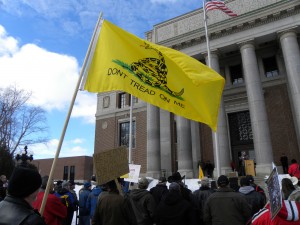
Gun-control proposals are often seen as attempts to deny Americans of their rights.
“It is a very calculated decision,” Mr. Azeredo said. “It is a European tradition not to let certain social classes have weapons, such as the peasant class, and not to allow the ruling class to be challenged.”
Others argue, however, that this rational concern for the rights of the common people is not applicable in America. The United States is not a communist country, nor a fascist one—and many believe American democracy is in no danger.
“I think it’s important we don’t construe the meaning of the Constitution but still recognize it for its value,” AMSA senior Krithi Gopalan said. “The Constitution [was written] in a context that is very different from today.”
The American Constitution was written during a time when guns were significantly less advanced than the modern weapons available today, and were used for the defense of the American population from foreign threats.
And many argue that banning guns from society cannot solve the issue of violence entirely. The most deadly mass killing in America other than the terrorist attacks of Sept. 11, 2001, was the Bath School disaster on May 18, 1927, when 38 children and six adults were killed in Bath Township, Mich.
The perpetrator did not use guns, but rather dynamite and incendiary pyrotol to massacre children and schoolteachers.
“Throughout history, people who are disturbed, whether with a gun or something else, will find a way to kill,” AMSA history department chair Dr. Anders Lewis said.
Even if the United States passed legislation limiting guns or if the Second Amendment was somehow repealed, it is difficult to imagine the problem of gun violence being eliminated. There are currently more guns than people in the country.
A Harvard Journal of Law & Public Policy publication Would Banning Firearms Reduce Murder and Suicide? by Don B. Kates and Gary Mauser argues that the murder rate in America might actually increase if guns were banned.

Memorials to victims of gun violence are becoming a common sight across the nation.
Eliminating gun violence by banning guns might seem like a logical conclusion, but the issue is more complex than that. Obtaining accurate data from around the world is difficult and sometimes unreliable.
Russia has, according to the Harvard study, falsified data to portray a significantly lower rate of gun violence, when in reality, it may be higher than that of the United States. The United Kingdom, famed for its low number of gun incidents, particularly after it banned most handguns in 1997, was also cited in the study for repeatedly not investigating gun incidents to their fullest extent.
“I think it’s true, to some degree,” Mrs. Richardson said. “But the more guns you remove, the fewer there will be, and it will be a process: the guns will have to dry up, and after five or six years, we should see a slow down.”
A study titled Shooting Down the More Guns, Less Crime Hypothesis conducted by Ian Ayres and John J. Donohue III from Yale University and published by the National Bureau of Economic Research agrees.
The studies which argue that more guns can lead to a safer society depend on a “regression analysis to argue forcefully that ‘shall-issue’ laws (which give citizens an unimpeded right to secure permits for concealed weapons) reduce violent crime. While certain facially plausible statistical models appear to generate this conclusion, more refined analyses of more recent state and county data undermine the more guns, less crime hypothesis.”
It argues that indeed a society with fewer guns will be safer and will see dramatically decreased rates of crime, as shown by this study’s findings in European nations.
But what about the guns that are left undetected in the hands of criminals? Should the public choose to repeal a constitutional right and tradition, what danger are innocent law-abiding citizens in, devoid of the means of self protection that a gun offers?
“I very much agree with the people who say if one of the victims in a mass shooting had a firearm, it would have turned out a lot differently,” Davepriyan said. “Everyone can’t be a sitting duck. The other option is just the victims being helpless. And that’s not okay.”
Every organism has the right to self defense. Insects, animals, and plants alike have developed stronger and more effective methods of self defense over the course of evolution, Mr. Azeredo said.
“Strange we would deny humans the right to defense,” he added.
Yet, a study published in the Oxford University Press by Nella Van Dyke and Sarah A. Soule titled Structural Social Change and the Mobilizing Effect of Threat: Explaining Levels of Patriot and Militia Organizing in the United States determined that states in this nation with stricter gun-control laws have significantly fewer gun-violence incidents than in states which favor more relaxed gun laws.
Gun-control, according to the study, is the surest way to protect Americans—more guns mean more mass shootings.
A compromise between these two sides calls for a partial ban of guns—one that allows Americans to maintain the right to bear arms and the freedom associated with it, but one that limits which weapons they are allowed to have.
“I don’t believe in a gun-free society,” Kathya said. “I believe we have the right to protect ourselves, but not to the point of flimsy gun laws. We need more control over it, while still maintaining our rights. And we need harsh stipulations to violations of the law.”
In other words, common-sense restrictions.
“You have to draw the line somewhere,” Davepriyan said. “Honestly, I think any high-power, fully automatic weapon that’s used militarily or is in active use in the military should not be given to civilians.”
Today, despite the laws in place, loopholes in gun show laws allow for the purchase of firearms without a background check, although in 2009 the Gun Show Loophole Closing Act attempted to make it more difficult to bypass background checks.
Even with background checks, the system has proven to lack comprehensiveness and completeness.
An investigative journalism piece by Larry Buchanan, Josh Keller, Richard A. Oppel Jr., and Daniel Victor in The New York Times found that “the vast majority of guns in 15 recent mass shootings, including at least two of the guns used in the San Bernardino [Calif.] attack, were bought legally and with a federal background check. At least eight gunmen had criminal histories or documented mental health problems that did not prevent them from obtaining their weapons.”
“The system is so privy to being abused,” Kathya said. “I think that’s the real root of the problem.”
During the course of six interviews conducted for this story, all six people became teary-eyed at some point while discussing the loss of life and the prospect of more lives being lost in the future.
Some became teary-eyed at the thought of guns being so readily available that an atrocity similar to the Sandy Hook Elementary School massacre of 2012 could happen again. Others were similarly affected by the idea that innocent Americans could be murdered while sitting helplessly, such as in the movie theater shooting in Aurora, Colo.
Every interviewee had a rationale for their beliefs, and in fact often drew on the same moral principles. The right to life, and the right to the protection of life was prominent on both sides.
The implications of this are profound: if all viewpoints have a clear and valid rationale, and they draw upon similar moral principles, then the nation can truly have a conversation about how to best protect American lives.
Americans can compromise; they can realize that someone with a philosophical disagreement is not an adversary, and is not stupid, a monster, or morally corrupt for having their beliefs.
“What else is politics for, if not for that?” Dr. Lewis asked. “There has got to be something we can do to at least prevent a few of these [shootings] from happening, and then we will have at least saved the lives of fellow humans, and that is a worthy endeavor.”

Raphael is a senior fascinated by innovations across many different fields of studies. He enjoys using computer technology to enhance the language of storytelling...

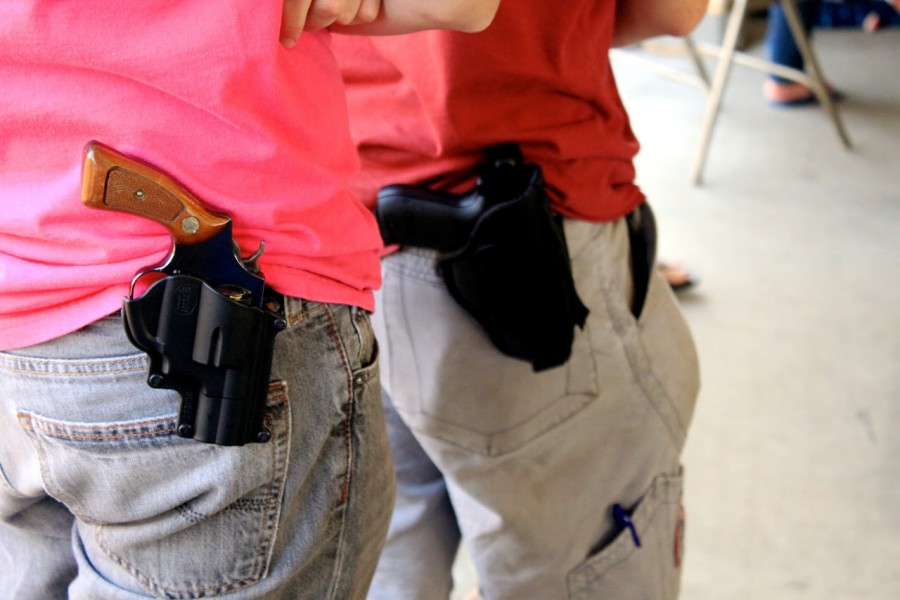
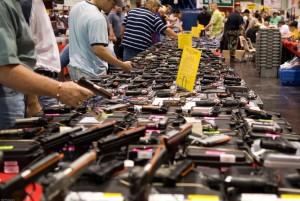
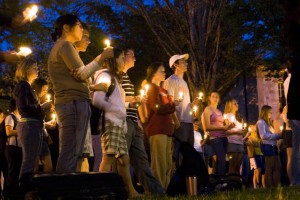
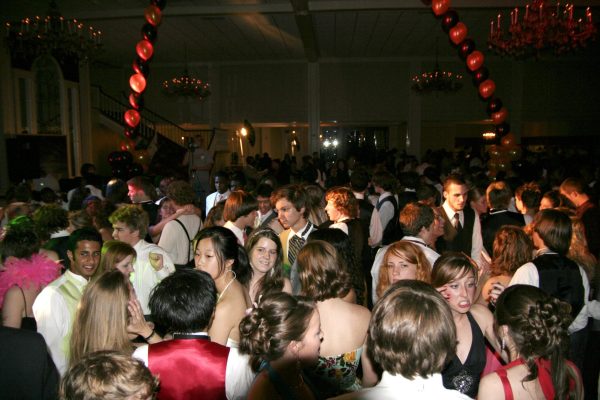


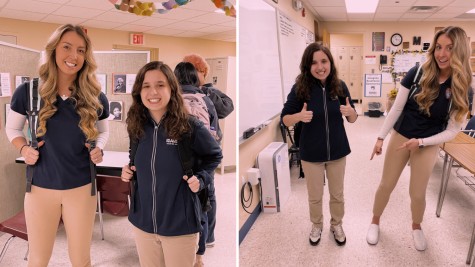

Kassie Peloso • Dec 20, 2015 at 2:15 pm
Great article! I see both sides of the story, and I love the supporting facts!